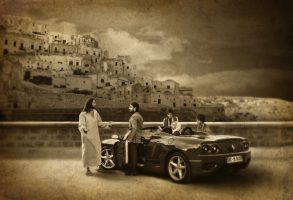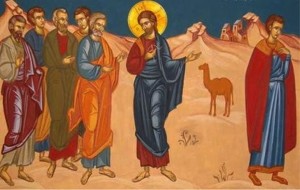When giving thought to what happened to the rich young man, we often pay primary attention to the fact that he did not follow Christ and did not decide to give up his wealth, as well as to the words that the Lord spoke to him and to His disciples: “It is easier for a camel to go through the eye of a needle, than for a rich man to enter into the Kingdom of God.” We often neglect the beginning of this story, when the rich youth came to the Savior with the question: “What good thing shall I do, that I may have eternal life?” To which the Lord answered him: “Keep the commandments.” The youth asked “Which?” Jesus replied: “Thou shalt do no murder, Thou shalt not commit adultery, Thou shalt not steal, Thou shalt not bear false witness. Honour thy father and thy mother: and, Thou shalt love they neighbor as thyself.” And the young man replied: “All these things have I kept from my youth up” (Matthew 19:16-26.)
Let us project this story onto our own lives and ask ourselves: Can we respond to the Lord with a clear conscience, as the rich youth did: “All these things have I kept from my youth up?” Do we keep the Ten Old Testament Commandments that were given to humanity as a foundation for its moral survival? Can we place ourselves on the same level with this rich young man? We see what is happening around us today, in our society. Murder has become commonplace – and not only on the criminal level, but also in terms of those killings that are committed daily by thousands of Russian women: the killing of the fetus in the womb. Theft has become a common occurrence. Over the past week our church shop has been robbed twice, and a few days before that the donation box for the church’s upkeep was stolen. People steal icons and Gospels, and we begin to feel that all this is par for the course. We tell ourselves: this happens because people have a difficult time making a living, they lack money, etc. But why is it difficult to make a living, why do people lack money? It is because theft is taking place at every level, including at the highest, when millions of dollars are stolen, to the very lowest, when a cashier cheats you out of three rubles in the store. Large-scale theft begins with small-scale theft, and massacres also begin with individual cases. Everything in the world is interconnected. Such as are the people, so will be their government; and vise versa, such as is the government, so will be the people. If the people steal, then thieves will end up on government; and if the government robs people, then people will steal from the state.
Not long ago, while making another trip to England, I found myself in a small town in which there is a thirteenth century church. Entering it, I was pleasantly surprised to find that the doors were wide open, that there were neither guards nor police, and that on the altar lay ecclesiastical utensils – chalices and crosses; there were icons on the walls, alongside of which were statues of the saints, and for some reason it did not enter anyone’s head to steal any of this. Moreover, the keepers of the church would not think of placing guards there or setting an alarm, because trust for one another is at the basis of their life.
Of course, we can say that we are not personally involved in what goes on around us: we neither kill nor steal. But we are part of our people about which it is sometimes said that we are a God-bearing people, a people to whom God has entrusted a special mission; but in fact, at least in our days, this nation does not only not keep the Christian commandments, but the Old Testament commandments, either. But the moral and spiritual healing of society cannot begin until a moral and spiritual rebirth of each individual person takes place, both those who stand at the pinnacle of power, and those who are on our level, the level of ordinary people. Only when each person learns to follow the Ten Old Testament commandments, when they stop killing and stealing, when people learn to respect their fathers and mothers, and not treat the elderly as many treat them today – as unneeded waste materials, unfit for anything – only then can we talk about the spiritual rebirth of society.
The moral ideal of Christianity is very lofty, and there are very few capable of following it and living on par with the requirements set forth for us by the Gospel. But we should remember that if Christ said “That a rich man shall hardly enter into the Kingdom of Heaven” (Matthew 19:23), that neither riches themselves nor money is being condemned, but rather everything which can result from the pursuit of wealth. After all, people who break into the doors of a church, steal icons and liturgical items and, more recently, kill clergy with the purpose of robbery, do this in pursuit of wealth. And none of them can be justified by saying that they lack money. Many of us lack money, just as the majority of people in the history of humanity have lacked money. But the absence of money is not an occasion for immoral acts. The lack of money is not an excuse to violate the commandments, either of the New Testament or of the Old.
Wealth in and of itself cannot prevent one from entering the Heavenly Kingdom, just as poverty in and of itself does not guarantee entry thereto. The Heavenly Kingdom is granted to those who are able to share their wealth with others and to direct it to good deeds. The Kingdom of God is granted not to those who are simply poor in material terms, but to those who are “poor in spirit,” who “hunger and thirst after righteousness,” and are “pure in heart,” as the Gospel tells us. We hear these words at every Liturgy, and every time they sound forth as judgment over each one of us and over our society as a whole.
The Ten Old Testament Commandments likewise judge us. And we, Christians, should learn to make these Ten Commandments, which the young man observed, the foundation of our lives: on the personal level, on the level of our families, and on the level of our relationships with colleagues at work. And then these moral norms will gradually extend from specific people to all of society, for the spiritual transfiguration of society begins with the spiritual transfiguration of each one of us. And once we have learned to fulfill the basic commandments, we can think about the next step, which the rich youth could not take: how to give away one’s property, take up the Cross of Christ, and follow Him. Amen.
Translated from the Russian




















